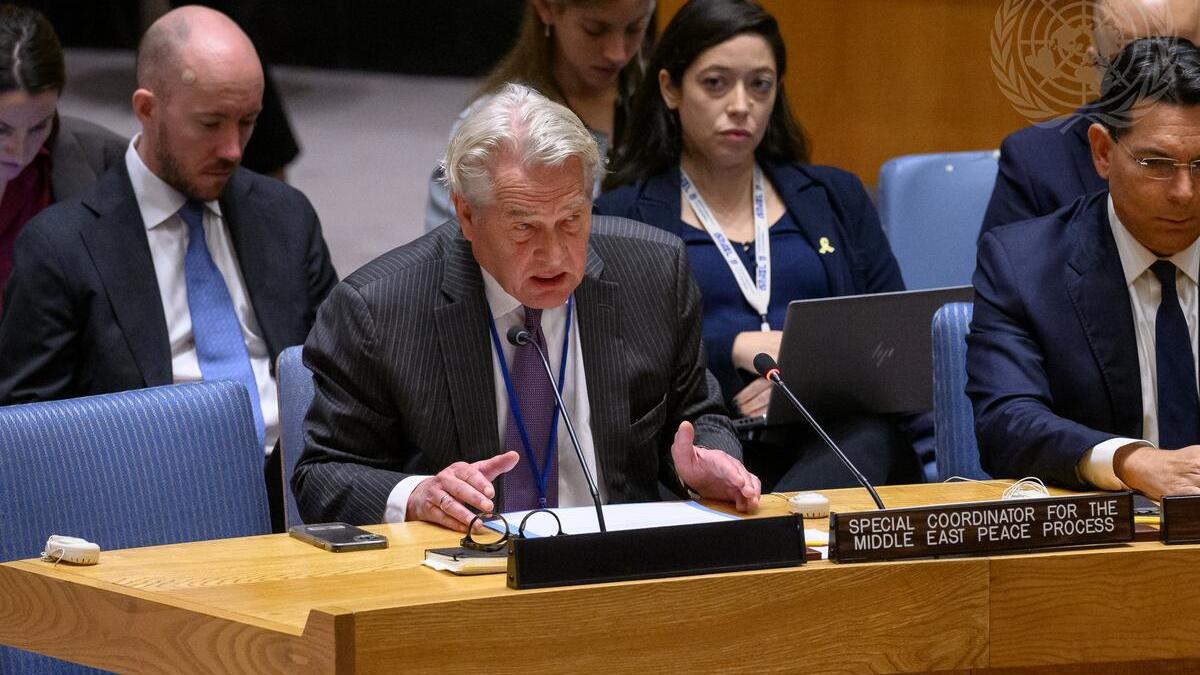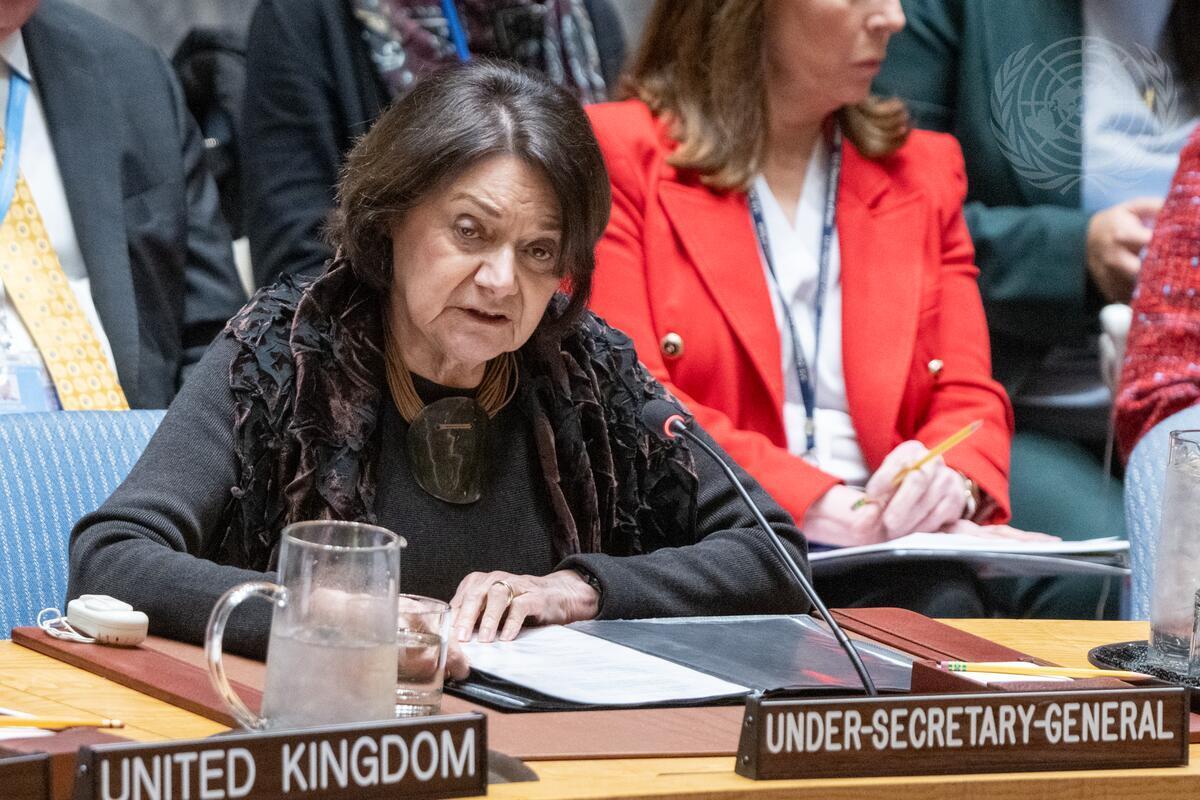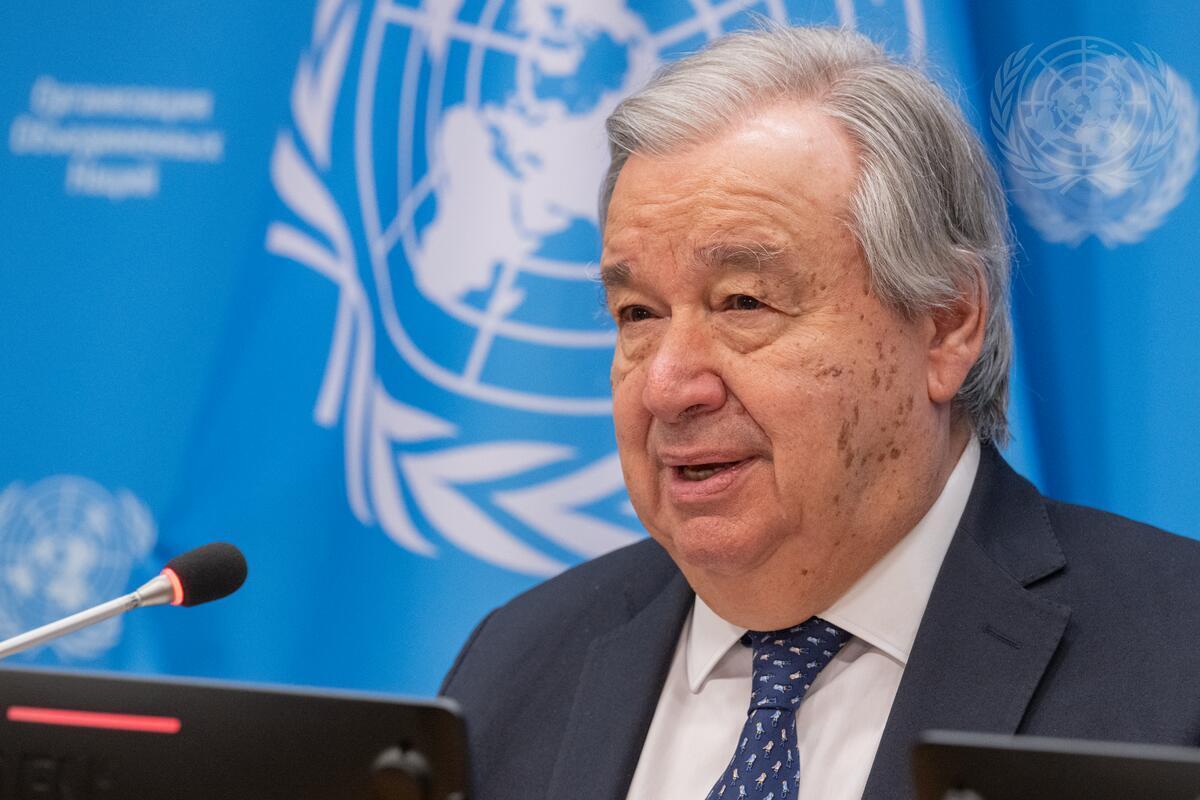Mr. President,
Members of the Security Council,
Excellencies,
We have now entered the second year of this horrific conflict, and the region is on the verge of yet another serious escalation.
The violence in the Occupied Palestinian Territory and wider region shows no signs of abating.
Just yesterday in Gaza, Israeli forces struck a building in Beit Lahiya, leaving at least 60 Palestinians killed, including at least 25 children, according to preliminary figures provided by the Gaza Ministry of Health. This strike is yet another in a deadly series of recent mass casualty incidents in the northern part of the Gaza Strip.
We are witnessing not only a horrific humanitarian nightmare, but a rapidly accelerated unraveling of the prospects for a sustainable resolution to this conflict.
Last week, I was again in the Gaza Strip and what I witnessed defies imagination.
In the southern part of the Strip, I saw the sheer magnitude of the devastation this war has inflicted on the population. I saw the immense destruction – of residential buildings, roads, hospitals, and schools. I saw thousands living in makeshift tents, with nowhere else to go as winter is approaching. Let me add, Mr President, anecdotally, that on the way from the crossing into Gaza up to the Japanese health compound, I could only count two buildings that were not totally or partly destroyed.
I spoke to our UN colleagues and their humanitarian partners, who face increasing challenges in their tireless efforts to deliver vital assistance. They described the dire humanitarian situation in northern Gaza, which has received virtually no humanitarian assistance since the start of October.
I heard also from Palestinian NGOs, whose demands were very clear: The war must end. Civilians must be protected, and they must be able to access assistance to meet their basic needs. And even in the face of just trying to survive, they recognized that there must be a political solution to the conflict and an end to the occupation.
In Israel, I have also heard the cries of victims. The seventh of this month was a grim marker of Hamas’ horrific attack in Israel that terrorized the population and marked a year of captivity for hostages still held in Gaza, in unbearable conditions, denied ICRC visits and their fates unknown. For them, as well, this nightmare must end, and the hostages must be freed.
Mr. President,
We are also at the most dangerous juncture in the Middle East in decades.
You were briefed yesterday by my colleague on the serious escalations between Iran and Israel this month.
Meanwhile, the hostilities between Hizbullah and Israel are inflicting civilian casualties, massive displacement and destruction on both sides of the Blue Line. Armed groups operating from Yemen, Iraq and Syria also continued to launch missiles and projectiles toward Israel. Israel has reportedly carried out dozens of airstrikes in Syria in the past month.
Mr. President,
Every effort – by all of us - must be made to de-escalate the situation and establish a different trajectory toward greater peace and stability in the region.
We need a ceasefire. We need the hostages released from Gaza now. I urge all parties to engage constructively in urgent diplomatic efforts to de-escalate the situation and avoid an endless spiral of death and destruction.
Mr. President,
In the almost 13 months since the brutal attacks perpetrated by Hamas and other Palestinian armed groups on 7 October 2023, more than 42,000 Palestinians and over 1,600 Israelis and foreign nationals have been killed, with 101 hostages still held in captivity in Gaza.
Tens of thousands of people have been injured, the vast majority of them Palestinians, including a staggering number of women and children. Palestinian medics, journalists and over 230 UN staff have been killed.
Israeli military operations and fighting with Hamas and other Palestinian armed groups continued across the Strip. Israeli military evacuation orders cover over 80 per cent of the Strip. Nearly 2 million people are displaced.
In recent weeks, Israeli military operations have intensified in the northern Strip, killing scores of Palestinians. Military actions have also caused the closure of essential services, including water wells and medical facilities, further exacerbating the humanitarian crisis.
I again unequivocally condemn the widespread killing and injury of civilians in Gaza, the endless displacement of the population in Gaza and the shocking mistreatment of detainees.
I also condemn the continued holding of hostages in Gaza and the firing of rockets toward Israeli population centres, which has continued this month.
Mr. President,
A fundamental shift is required to improve humanitarian operations in Gaza. It is essential to establish a safe enabling environment, meet operational requirements including funding, and ensure that Israeli authorities facilitate access, that will allow for unimpeded movement of food, shelter materials for the winter, medicine, fuel, and the capacity to repair essential life-saving infrastructure. The mounting lawlessness inside the Strip must also be addressed.
The second round of the polio campaign began on 14 October in central and southern Gaza, and it was very successful with over 90 per cent vaccinated, but we have yet to access the north. I urge Israeli authorities to facilitate the full rollout of this campaign and to facilitate a similarly coordinated effort to meet winter needs.
Mr. President,
As the focus remains on Gaza and the escalating violence in the region, the situation in the occupied West Bank, including East Jerusalem, is also deteriorating.
Violence continued at alarming levels, having intensified since the conflict in Gaza began.
During the reporting period, 54 Palestinians, including three women and eight children, were killed, mostly in the context of ISF operations in Area A, which the IDF say are targeting Palestinian armed groups and militants.
In the same period, 8 Israelis, including four women, were killed by Palestinians in shooting attacks in the West Bank and Israel. Another two Israelis, including one woman, were killed in separate shooting attacks in Israel by Arab citizens of Israel.
On 1 October, two Palestinians carried out a shooting and stabbing attack in Jaffa, killing seven and wounding 15.
On 3 October, in Tulkarm, 18 Palestinians were killed in an Israeli airstrike, including one woman and three children. ISF said they killed a Hamas commander and several Hamas and PIJ militants in the camp. This was the single deadliest such incident in the West Bank in nearly twenty years.
With the start of the olive harvest this month, daily settler attacks and harassment continued across the West Bank, sometimes with the presence or support of Israeli forces.
On 17 October, an IDF personnel shot dead a 59-year old Palestinian woman harvesting olives in the West Bank.
The olive harvest is critical to the Palestinian local economy. However, settler violence along with restrictions on access to land imposed by both settlers and Israeli forces place it at grave risk.
I strongly condemn all acts of violence against civilians, including acts of terror.
I call on Israel to protect the Palestinian population and to hold perpetrators of all violence accountable. I urge security forces to exercise maximum restraint and use lethal force only when it is strictly unavoidable to protect life.
Mr. President,
On 28 October the Israeli Knesset adopted two laws on UNRWA forbidding Israeli state officials from contact with UNRWA or its representatives and prohibiting UNRWA operations within what is referred to as the sovereign territory of the State of Israel. These developments risk the collapse of UNRWA’s operations across the occupied Palestinian Territory and severely undermine humanitarian operations in Gaza, which rely on UNRWA. These bills are set to go into effect in ninety days.
The rights of Palestinian Refugees were set out in a General Assembly resolution that predates the creation of UNRWA. Unilateral steps, such as legislation, which seek to not only undermine United Nations’ mandated work, but threaten to further set back a political resolution to the conflict on the basis of UN resolutions and international law must be avoided.
Mr. President,
The confluence of challenges across the region requires us to act with urgency to cease hostilities and de-escalate.
We must have a ceasefire now. We must have release of hostages in Gaza now.
Without a ceasefire, the fundamental shift required to scale up humanitarian assistance that can meet the current catastrophe and to improve the situation for humanitarian deliveries will be impossible.
We must also concretely advance a political resolution to the Israeli-Palestinian conflict, including by ceasing irreversible and unilateral steps on the ground that undermine the two-State solution.
We urgently need a set of understandings to establish a political and security framework in Gaza in line with the principles I have outlined repeatedly to this Council.
These frameworks must facilitate a Palestinian governance structure that can re-unify Gaza and the occupied West Bank, including East Jerusalem, politically, economically and administratively with no reductions in its territory, with no displacement of Palestinians from the Strip.
All efforts to these ends must be prioritized.
I am very concerned that facts on the ground are being established that will undermine these core principles for years to come. This includes the attempt by Israel to dismantle UNRWA.
As I have repeatedly said, there can be no long-term solution in Gaza that is not political. There must be a path to the end of the occupation and achieve a two-State solution.
Mr. President,
Israelis and Palestinians don’t deserve this unrelenting conflict that has ruined countless lives. They deserve a better future, one without open-ended conflict, occupation and a regional war.
We must do everything in our power to chart a course towards a just and lasting peace that will enable a two-State solution on the basis of UN resolutions, previous agreements, and international law, with Jerusalem as the capital of both States.
The UN stands ready to support all these efforts.
Thank you.






